- Home
- Allan Topol
Conspiracy Page 5
Conspiracy Read online
Page 5
"Oh, it's great. First you electrify my mind by telling me about your investigation. Then you zap the rest of my body with the shrimp. Tears are about to start pouring out of my eyes and I can't move my mouth. Aside from that, I love it."
"It is a bit hot."
Moore gulped down the rest of his beer and a full glass of ice water. "Now tell me what Abdul Azziz has to do with this Boyd election business."
"I don't know."
"So you just invited me here to burn out my G.I. tract."
Cady smiled. "The envelope on my desk contained the indictment and the sentencing order in the Azziz Texas securities case you handled. There was no apparent link to the Boyd election fraud charge. I was hoping you could supply that link."
An odd spark lit in Moore's eyes. "What else was in the envelope?"
"A deed to the Mill Valley property. It shows that Boyd sold out to a French company, Maison Antibes, headquartered in Lyon, which still owns Mill Valley. I did some research, and I learned that the president of Maison Antibes at the time of purchase was Henri Chapell. He died two years after the transaction of a heart attack. I couldn't find the names of any other principals of Maison Antibes. That's as far as the information has taken me. Got any ideas?"
Moore nodded. "Just one. It's a shot in the dark."
"What's that?"
"At the time of his conviction in my case, Azziz was an Iraqi citizen living in California. But I also remember that he had lived in France for about five years before he moved to this country."
"You think he could be involved with Maison Antibes or Henri Chapell?"
"The names never appeared in my case, but it's a possibility."
"I need something. I'm at a dead end." Cady took a long sip of beer. He wondered whether he was cleverly solving a difficult puzzle, or simply following a false trail that someone had created for him.
"If you ever meet Azziz, you'll love questioning him. He's such a charming fellow."
"I might have to do that. Any chance you could check the file tomorrow and get me an address for Azziz?"
"I don't have to. Having been there once, I could never forget it. He lives in L.A., up on Sunset, three blocks west of the Beverly Hills Hotel. It's a stone house painted dark green. In the center of the front lawn there's a statue of a nude woman with her pubics painted dark green as well. You can't miss it."
Cady smiled. "I wouldn't think so. You know if he still lives there?"
"I've got no idea. Happily, that was the end of my relationship with Mr. Azziz. But I'll call you in the morning with his phone number from the file. If it doesn't work, the FBI in L.A. should be able to trace him for you." Moore paused to give his old friend a measuring look. "You sure you want to do this?"
Cady nodded weakly. "I feel as if somebody just handed me a live grenade minus the pin."
Chapter 4
Yahiro Sato couldn't have been any happier.
He was sitting in the corner suite on the top floor of the forty-story Sato Industries building, overlooking the Imperial Palace in Tokyo, preparing for a television interview. Much of the day he had spent polishing answers to the questions he would receive, while smoking one cigarette after another and eating sushi from a lacquered tray at his desk.
A month ago, when he had announced that he was a candidate for prime minister in the December 28 election, no one had taken him seriously. A rich industrialist catering to the militant right-wing fringe was how one Tokyo daily had described him. Well, now they were singing a different tune. Everyone considered him a contender to unseat Prime Minister Nakamura, and his star was still rising fast. He was even being taken seriously in the United States, thanks to the Alex Glass series in the New York Times.
At precisely six o'clock, he heard a knock on the door. That pleased Sato. He liked subordinates to comply with his directives. "Yes?" he said, lifting his head.
The door was opened by Terasawa, accompanied by Toshio Ozawa, an ally and confidante of Sato's for more than twenty years. Dressed in a military uniform, Ozawa was the commandant of the National Self-defense Force, the only quasi-military defense force permitted under the Japanese constitution. If Sato became prime minister and the constitution was amended to permit a full-fledged military, Sato intended to appoint Ozawa as commander-in-chief of the new Japanese military.
Two smartly dressed young women in short black skirts, matching bookends, brought in cups of green tea for the three of them, bowed, and then withdrew quietly, closing the door of Sato's office behind them.
Terasawa took his cup and retreated to a corner of the room. The bodyguard knew his place. Dressed in a dark blue suit, a white shirt, and a tie, he could have passed for a salary man if not for the long scar on his cheek. When he was angry, his face turned to a menacing scowl.
Reaching for the stack of papers on his desk, Sato pulled out several neatly typed pages and handed them to Ozawa. "The spontaneous answers to the spontaneous questions that will be called in by viewers on tonight's television interview."
The normally humorless Ozawa cracked a smile. "Do you talk about China?" he asked.
"Read it. I've ratcheted up the pressure. Let them choke on their own tongues in Beijing."
As Ozawa read the script, he nodded. Only at the end did he wrinkle his forehead. "You deal with the Americans in strong terms."
Sato puffed deeply on his cigarette. "I've made my position clear. All American troops must leave Japanese soil within thirty days of my election on December twenty-eighth, and we will delete Article Nine of the Japanese constitution."
"But you'll need Diet approval for these steps. I'm worried that you won't be able to get it. Too many of the legislators will be intimidated and roll over for Washington. Also, the United States can bring economic pressure. You know that."
"Suppose I were to tell you that the American president will agree with my program and remove all of their troops without even a whimper?"
Ozawa raised his bushy eyebrows. "You know that?"
"Webster has told that to one of my people. He and his top aides are concerned about growing military power in China. They see us as an important offset to Beijing. They also see the Asian conflict as a matter to be solved by Asians. They view American military expenditures in Japan as a drain on their badly stretched defense budget. One that can easily be eliminated."
"And the Democratic candidate?"
"My trip to Buenos Aires last month was a success. I have a plan to deal with Boyd. It's a Japanese politician who's worrying me more right now."
Sato turned toward Terasawa, whose gold tooth in the front of his mouth glistened under the overhead lights in the office. He was the perfect bodyguard, Sato thought, even to the point of speaking English, which was important because Sato traveled so much. The son of a Japanese woman and an American military man who had been stationed in Japan but stayed after his tour of duty to expand a lucrative smuggling operation in and out of Poxes on American bases, Terasawa had been christened Paul O'Brien. At the age of twelve he killed his father, a drunken lout who regularly beat his mother, and ran away. He'd lost himself in the underworld of the Yakuza and taken on a name from his mother's family. That was where Sato had found him two years ago. He also liked the fact that Terasawa was smart. When Sato gave him an assignment, Terasawa quickly devised a way to get it done.
"Tomorrow evening," Sato said to Terasawa, "Masaki has scheduled a rally at the Kokuritsu Gekijo Theatre to condemn my visit to the shrine in the afternoon."
Terasawa nodded and leaned forward.
"Masaki and his left-wing communist group have been a thorn in my side since our campaign began. Tomorrow would be a good time to eliminate that thorn once and for all."
Terasawa nodded. "It will be done," he said grimly. Tonight he would meet with some of his friends in the Yakuza. He knew exactly what they would do.
* * *
Rather than in a television studio, Sato conducted the interview in his office. For the session he directed aides
to install a large flag of Japan, the red sun against a white background, behind his desk where it would be hugely visible.
Sato had provided all of the questions, lobs up to the net, to Mori, a friendly reporter who was conducting the interview. Dressed in a dark suit, pale blue shirt, and a tie, and looking statesmanlike at his desk, Sato was relaxed, easily fielding Mori's questions, plus the call-in questions from viewers.
Following Sato's script, the first viewer asked, "If you are elected prime minister, will you apologize to the Chinese people for atrocities committed during the war, such as the rape of Nanking?"
Sato looked straight into the television camera. "It's time we set the record straight. The number of those so-called atrocities has been grossly exaggerated. To be sure, in any war some soldiers become carried away, but that's much different from a collective sense of guilt, which some of our politicians would impose upon the Japanese people."
"How would you deal with the issue of Taiwan?"
Sato paused, wanting to appear as if he were thinking about the question. "I plan to visit Taiwan next month before the election. In that visit I will urge the residents of the state of Taiwan to select—and I will support—whatever destiny they wish to pursue, whether it be union with the People's Republic of China, a continuation of the status quo, or full independence." Cognizant that his words were tantamount to a declaration of war with China, he had asked Mori to pause before he took the next question to make certain that Sato's words sank in.
The final set of questions from viewers concerned the United States. On this subject Sato tried to portray himself as very provincial, in the style of a traditional Japanese leader. He had to be careful, because the reality of his life was so different. He had started a company that made a novel computer chip widely used in telecommunications, which AT&T had acquired ten years ago. For the negotiations, held in New York, Sato had taken up residence at the St. Regis for a month.
"My program," Sato said, "begins with the repeal of Article Nine of the constitution. That language, written by General MacArthur and imposed on a weak and prostrate Japan, states: "The Japanese people forever renounce war as a sovereign right of the nation...' and that land, sea, and air forces, as well as other war potential, will never be maintained.
"I won't argue about whether Article Nine made sense in the days immediately after World War Two. However, it clearly makes no sense at this time, and it's a humiliation." He stopped and repeated the word humiliation for emphasis.
"We've suffered enough for our loss in the war. Our sins didn't remotely approach those of the Germans, who slaughtered more than six million innocent civilians. We, in fact, helped Jews to escape from Europe and safeguarded those Jews under our control in Shanghai. We should now have the right to create and to maintain any military force appropriate for our own defense, just as Germany has that right. Not merely some pasty civil defense force to take action in case of an earthquake or tornado. We don't want the United States to defend us. We want to be able to defend ourselves if our enemies seek to undermine our economy and to destroy the balance of power in Asia. Wars begin when one party is strong and the other is weak."
"Finally, let's not delude ourselves into believing that the American troops are in Japan to defend us. They are here to keep our military in check. That's the reality. Anything else is fiction. It's time that the United States withdrew those troops."
A viewer asked, "How do you believe the American president will react to your proposal to remove all American troops from Japanese soil?"
With black eyes blazing, Sato responded, "I am confident that the American president in office at the end of next January will support my program as honorable for Japan and in the interest of world peace."
* * *
Alex Glass was exhilarated as he sat at his desk in the New York Times's bureau office on the twentieth floor of a high-rise in the center of Tokyo, staring at the television set that was blasting out analyses of the Sato interview by Japanese commentators. In the seven years he had been in Tokyo as a reporter for the Times, Glass had been looking for the big, big story that he could ride to fame and fortune the way Woodward and Bernstein had at the Washington Post with Watergate.
Six years ago he had thought he had it with the global-warming conference in Kyoto, but nobody back home cared very much if increased temperatures eroded their quality of life. For Glass, the only good that came out of the Kyoto conference was the four-week affair he had had with that dish Taylor Ferrari, a member of the American delegation. It had been the first and only time Glass was in love, but not enough to consider giving up his great job in Tokyo and moving back to Washington. Though Taylor had studied Japanese in college, he knew that there was no way she would ever live here. He never even broached the question with her. It wouldn't have worked anyhow. She was seven years older, and he doubted that she was in love with him. So what? The sex was great, and she was fun to be with.
That was six years ago. Now he was on the verge of a Pulitzer. The rise of Yahiro Sato and the growth of Japanese militarism was a huge story—the largest involving the United States and Japan since the 1945 surrender. Here was the horse that Glass could ride, and that was precisely what he was doing. A month ago he pleaded for authorization from Steve Terry, the Times bureau chief in Tokyo, to do a lengthy three-part series on Sato. Research for that had gotten him squarely in the middle of Sato's organization, and established him as an expert. He was also the messenger sounding alarms for Washington.
Portions of the series were being widely quoted. Alex was now a celebrity. Last week a CNN reporter referred to him as one of the top foreign journalists in Tokyo; "What Glass writes can't be brushed aside," the reporter said. And the series was only the beginning. Now Terry was telling him to provide daily coverage on Sato. Glass was thrilled that he had picked the right horse in this race.
Alex turned off the television set and his computer, grabbed his motorcycle helmet, and rode down in the elevator. He needed to relax for a couple of hours over dinner in one of the clubs in the Roppongi. After that he'd come back and work some more—if he couldn't entice some young beauty into his bed first.
Alex had another reason for feeling good. Besides garnering a Pulitzer, at long last he'd gain the respect of Martin Glass. Then old Dad wouldn't think he was a worthless, lazy dilettante because he had refused to go to work in the family auto-parts business back in Seattle.
Stop kidding yourself, he thought as he put on his helmet while walking toward his Kawasaki. Old Dad will never be proud of me, no matter what I do, unless and until I join Glass Auto Parts. "The Crystal-clear Supplier."
When he had spent time with Taylor she had told him, "Stop being such an ass. It's time you gave up the family guilt horseshit."
For Alex that was easier said than done. He had something to prove to his father. He would do it with his in-depth coverage of Yahiro Sato and the rise of Japanese militarism.
Chapter 5
Taylor looked at the computer screen in her office at Blank, Porter, and Harrison and winced. "Ah, damn. Not now." She reread the e-mail message.
I have a new transaction to discuss with you. Can you meet me for breakfast tomorrow at the Four Seasons in Washington at eight a.m.?
Kenzo Fujimura.
At any other time she would have liked nothing better than to hear from him. Fujimura, a prominent Japanese lawyer whom Taylor had met at the Kyoto global-warming conference, had become a friend and the source of most of her law work, as he funneled American projects to her for his largest Japanese clients in the energy sector, particularly M. H. Heavy Industries, which was buying energy-related companies in the United States. The relationship was mutually beneficial. She knew the energy area from her years as a congressional staffer, and she could draw on the specialized expertise of other lawyers in the 160-person firm—depending upon the project. The trouble was that Fujimura always demanded her own personal involvement. This email was just what she didn't need right now.
Not after a sleepless night spent tossing and turning about the information Coop had delivered to her yesterday.
She hit the intercom. "Kathy, reply to Fujimura's e-mail. Tell him I'll be there. I'm going down to Philip Harrison's office."
As she walked along the hardwood corridor lined with rich Oriental carpets, Taylor thought again about Coop's information. She made up her mind that she wouldn't sit around and wait for the senator to go down in flames. If in fact a criminal investigation was under way, she wanted to stop it. The trouble was that she didn't have any decent contacts at a high level in the U.S. attorney's office. Oh, well. She'd worry about that later. For now, she'd better try to cajole Harrison to take on Fujimura's new project. If she succeeded, she could limit her role to cameo appearances, and it would not detract from her work on the campaign.
Seeing that Harrison was on the phone, Taylor stopped to chat with Doris, his secretary. Once he spotted her through the open doorway, he waved her in to sit and wait while he finished his call. It was a typical Harrison performance. He was on the speakerphone with investment bankers and lawyers in New York. A step ahead of everyone else, he was spinning out a complex approach for the financial reorganization of an electric utility that the other members of his client's team knew was right if they could only understand it. As he spoke, he paced back and forth from his desk to the bookcases over a strip of worn carpet and fiddled with a plastic object that resembled a cigarette—one of twenty that his wife, Celia, had given the irritable and restless Harrison to avoid having him drive her crazy when he decided two years ago to stop smoking.
As always, the office was devoid of papers. Unlike mere mortals, Harrison, who had degrees in theoretical mathematics and law from Oxford as well as a photographic memory, had no need for the reassurance of having stacks piled up in his office, like most lawyers. Instead he had models of sailboats—his latest in a string of long passions, including chess, astronomy, and Greek tragedies that he read in the original language. Anyone else would simply be sailing boats, but Harrison had to design them as well, intrigued by the scientific concepts that permitted a sailboat to maximize its speed. Articles in the Washington Post had covered the boat he would be building to race in one of the top world-class competitions.

 Conspiracy
Conspiracy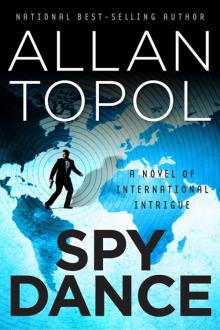 Spy Dance
Spy Dance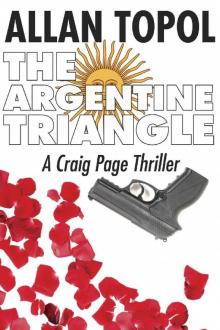 The Argentine Triangle: A Craig Page Thriller
The Argentine Triangle: A Craig Page Thriller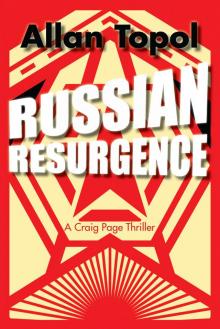 Russian Resurgence
Russian Resurgence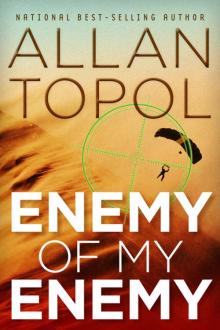 Enemy of My Enemy
Enemy of My Enemy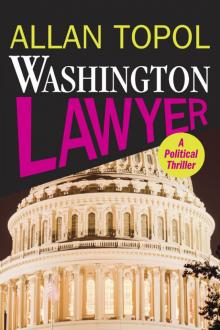 The Washington Lawyer
The Washington Lawyer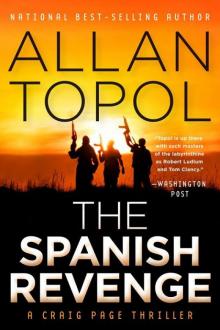 THE SPANISH REVENGE (Craig Page series)
THE SPANISH REVENGE (Craig Page series)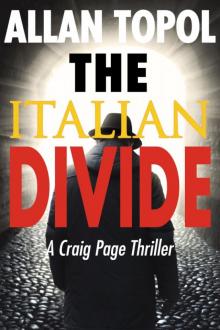 The Italian Divide
The Italian Divide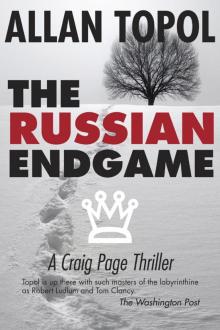 The Russian Endgame
The Russian Endgame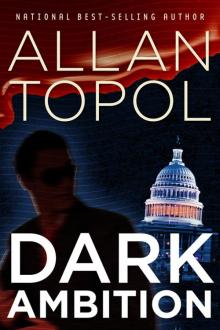 Dark Ambition
Dark Ambition